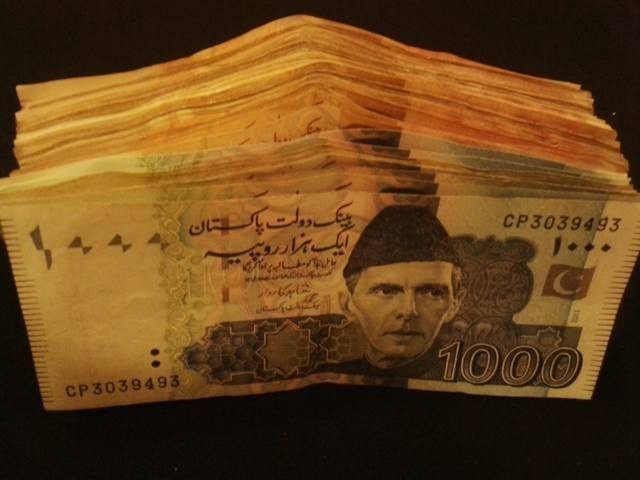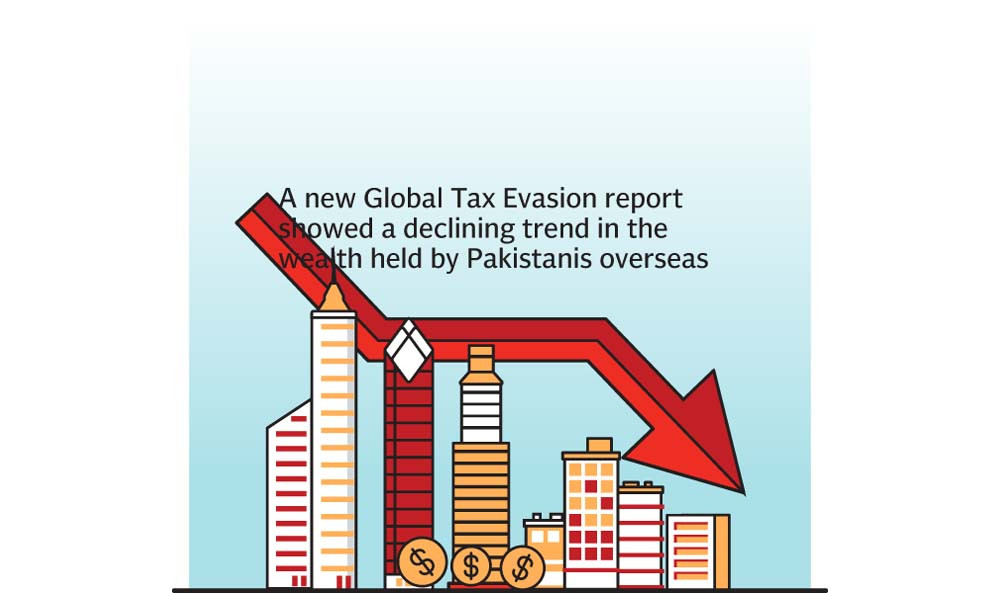Pakistanis’ overseas wealth falls
Global report urges 2% billionaire tax to generate $250b in annual revenues

Pakistanis own just over $19 billion in offshore wealth, with more than half of it invested solely in Dubai’s real estate, as per a new Global Tax Evasion report, reflecting a downward trend in the wealth held by Pakistanis abroad.
The report, produced by the EU Observatory, a body co-funded by the European Union (EU), also calls upon countries to impose a minimum 2% income tax on the world’s billionaires, aimed at increasing their current meagre income tax contribution of just 0.3%. The report suggests that imposing a 2% minimum tax could generate $250 billion in annual revenues from less than 3,000 billionaires worldwide who collectively hold $13 trillion in wealth but paid a mere $44 billion in personal tax last year.
The Global Tax Evasion report reveals that Pakistanis held $19.2 billion in offshore assets. This figure comprises $8 billion in cash, shares, bonds, and investments, along with an additional $11.2 billion invested in the real estate sector. This amount is equivalent to 3.6% of Pakistan’s Gross Domestic Product in 2022.
In terms of offshore wealth, Pakistanis held $8 billion in the form of equities, bonds, mutual fund shares, and bank deposits in 2022. Of this amount, the maximum, $4 billion, is held in Asian tax havens, followed by $2 billion in European tax havens, $1 billion in Switzerland, and $910 million in American tax havens. There has been a reduction of $1.1 billion in the wealth owned by Pakistanis abroad when compared to 2021. The reduction is primarily associated with assets held in Asian tax havens, which decreased from $5 billion to $4 billion.
Read: Economy showing early signs of improvement: SBP
Switzerland once held the highest amount of assets owned by Pakistanis, reaching $19 billion in 2007, but by 2016, this had dwindled to $2 billion, coinciding with the year of significant political change in Pakistan following the Panama leaks. This suggests that Pakistanis may have shifted their wealth from Switzerland to primarily Asian tax havens. In 2007, just over half a billion dollars was parked in Asian havens, a figure that swelled to $5 billion in 2021 before falling to $4 billion last year.
The report also covers the loss of revenues resulting from profit shifting by multinational companies. As of 2020, Pakistan suffered a $430 million loss in revenue due to profit shifting by these companies, with the bulk of this, $310 million, attributed to the shifting of profits to non-EU tax havens. This figure stood at $540 million in 2019.
The latest report reveals that Pakistanis own $11.2 billion worth of real estate in just three global cities: Dubai, London, and Singapore. This amount represents 3.4% of Pakistan’s GDP. Of this total, $10 billion is invested exclusively in Dubai, with an estimated value of just $740 million in London and $120 million in Singapore. Paris has just $18 million in assets owned by Pakistanis.

design: Ibrahim Yahya
Offshore real estate is characterised as property that is either ultimately owned by an investor in a different country or owned by residents through complex offshore structures that can obscure the true identity of the owner.
Prepared by the EU Tax Observatory, a research laboratory established in 2021, the report summarises the work of over 100 researchers worldwide, often in collaboration with tax administrations. Pioneering research conducted in conjunction with tax administrations indicates that global billionaires have remarkably low personal effective tax rates, ranging from 0% to 0.5% of their wealth, according to the report.
Effective tax rates for billionaires are significantly lower than those for all other segments of the population. The EU Observatory recommends a minimum tax on billionaires equal to 2% of their wealth to combat evasion and generate nearly $250 billion from fewer than 3,000 individuals.
Europe boasts 499 billionaires who collectively own $2.4 trillion in wealth but paid just $6 billion in personal income tax last year. If a 2% tax were imposed, $42 billion could be generated from this group. North America, with 835 billionaires who own $4.8 trillion in wealth, saw just $24 billion paid in personal income tax. At a 2% rate, their contribution could amount to $72 billion.
East Asia has the largest number of billionaires, with 838 individuals holding $3.5 trillion in wealth. Their contribution in taxes was a mere $8.6 billion, while a 2% wealth tax could yield $60 billion. In South and Southeast Asia, 260 billionaires own $991 billion in wealth, with $2.5 billion paid in taxes. With a 2% rate, their contribution could be $17.3 billion. In Russia and Central Asia, 133 billionaires have $586 billion in wealth and contributed $1.5 billion in taxes.
Effectively, 2,766 billionaires own $12.9 trillion globally but paid just $44 billion in taxes, equivalent to just 0.34% of their wealth. With a 2% wealth tax, they could contribute $214 billion.
Read more Overseas Pakistanis and devaluation
The report also recommends strengthening the global minimum tax on multinational companies, free of loopholes, to generate an additional $250 billion per year. Developing countries require $500 billion annually in additional public revenue to address the challenges of climate change, a need that could be met by imposing a 2% tax on just 3,000 of the world’s wealthiest individuals and closing corporate tax regime loopholes.
While the report acknowledges a decline in global tax evasion, it notes that a significant amount of profits, approximately $1 trillion in 2022, continues to be shifted to tax havens. The EU Tax Observatory recommends reforming the international agreement on minimum corporate taxation, implementing a 25% rate, and removing the loopholes that encourage tax competition. It also proposes institutional mechanisms to tax wealthy individuals who have been long-term residents in a country but choose to move to a low-tax jurisdiction.
The report suggests implementing unilateral measures to collect some of the tax deficits of multinational companies and billionaires in case global agreements on these issues fail. It seeks to move toward the creation of a Global Asset Registry to better combat tax evasion.
Published in The Express Tribune, October 24th, 2023.
Like Business on Facebook, follow @TribuneBiz on Twitter to stay informed and join in the conversation.


















COMMENTS
Comments are moderated and generally will be posted if they are on-topic and not abusive.
For more information, please see our Comments FAQ